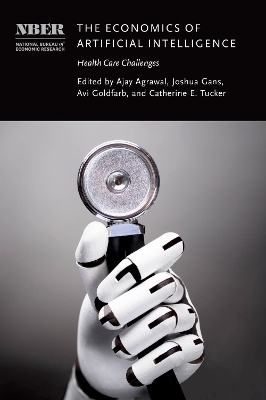
The Economics of Artificial Intelligence
University of Chicago Press (Verlag)
978-0-226-83311-8 (ISBN)
In sweeping conversations about the impact of artificial intelligence on many sectors of the economy, healthcare has received relatively little attention. Yet it seems unlikely that an industry that represents nearly one-fifth of the economy could escape the efficiency and cost-driven disruptions of AI.
The Economics of Artificial Intelligence: Health Care Challenges brings together contributions from health economists, physicians, philosophers, and scholars in law, public health, and machine learning to identify the primary barriers to entry of AI in the healthcare sector. Across original papers and in wide-ranging responses, the contributors analyze barriers of four types: incentives, management, data availability, and regulation. They also suggest that AI has the potential to improve outcomes and lower costs. Understanding both the benefits of and barriers to AI adoption is essential for designing policies that will affect the evolution of the healthcare system.
Ajay Agrawal is professor of strategic management and the Geoffrey Taber Chair in Entrepreneurship and Innovation at the University of Toronto. Joshua Gans is professor of strategic management and the Jeffrey S. Skoll Chair in Technical Innovation and Entrepreneurship at the University of Toronto. Avi Goldfarb is the Rotman Chair in Artificial Intelligence and Healthcare and professor of marketing at the University of Toronto. Catherine E. Tucker is the Sloan Distinguished Professor of Management Science at MIT Sloan.
Acknowledgment
Introduction
Ajay Agrawal, Joshua Gans, Avi Goldfarb, and Catherine Tucker
1. Artificial Intelligence, the Evolution of the Healthcare Value Chain, and the Future of the Physician
David Dranove and Craig Garthwaite
Comment: Dawn Bell
2. The Potential Impact of Artificial Intelligence on Healthcare Spending
Nikhil R. Sahni, George Stein, Rodney Zemmel, and David Cutler
Comment: David C. Chan Jr.
Comment: Mark Sendak, Freya Gulamali, and Suresh Balu
3. Health Data Platforms
Sendhil Mullainathan and Ziad Obermeyer
Comment: Tyna Eloundou and Pamela Mishkin
Comment: Judy Gichoya
Comment: Vardan Papyan, Daniel A. Donoho, and David L. Donoho
4. The Regulation of Medical AI: Policy Approaches, Data, and Innovation Incentives
Ariel Dora Stern
Comment: Boris Babic
Additional Comments
Comment on Chapters 1 and 2: Building Physician Trust in Artificial Intelligence: Susan Feng Lu
Comment on Chapters 1 and 2: Insights from Adoption of Electronic Health Records: Idris Adjerid
Comment on Chapters 1 and 3: Artificial Intelligence and Decision Making in Healthcare: Prediction or Preferences?: M. Kate Bundorf and Maria Polyakova
Comment on Chapters 1 and 4: Health AI, System Performance, and Physicians in the Loop: W. Nicholson Price II
Comment on Chapters 1–4: Building Blocks for AI in Healthcare: Laura C. Rosella
Author Index
Subject Index
| Erscheinungsdatum | 16.03.2024 |
|---|---|
| Reihe/Serie | National Bureau of Economic Research Conference Report |
| Zusatzinfo | 10 line drawings, 8 tables |
| Sprache | englisch |
| Maße | 152 x 229 mm |
| Gewicht | 399 g |
| Themenwelt | Informatik ► Theorie / Studium ► Künstliche Intelligenz / Robotik |
| Medizin / Pharmazie ► Gesundheitswesen | |
| Technik | |
| Wirtschaft ► Betriebswirtschaft / Management ► Wirtschaftsinformatik | |
| ISBN-10 | 0-226-83311-9 / 0226833119 |
| ISBN-13 | 978-0-226-83311-8 / 9780226833118 |
| Zustand | Neuware |
| Haben Sie eine Frage zum Produkt? |
aus dem Bereich


